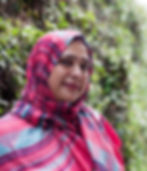Saadia Faruqi: STRONGEST HEART (mental illness in parent)
- A Novel Mind
- Oct 5, 2025
- 4 min read

A poignant exploration of the impact of mental illness on families—and the love and hope that it takes to begin telling a different tale.
When a child is sad or angry at school, or struggling to stay focused, most people wave it away as typical bad behavior. They blame the child’s parents, or phones, or violent movies. They denounce the days of gentle parenting, which allows kids to run wild. They say the family should’ve done a better job.
But what if parents are unable to do better? What if a child is acting out because their parents act out even worse, every single day?
I grew up with a mentally ill father. A lack of resources and stigma around mental illness meant we never really knew what he suffered from, but guesses ranged from
schizophrenia to bipolar disorder. My childhood was terrible through no fault of my own. I remember days when he’d be screaming and throwing things. Once, he threw a knife at my grandmother, but she ducked and went about her business like nothing had happened. My mother would ignore most of what he screamed, and sometimes I’d find her standing in a room alone, trying not to cry. But mostly, she kept herself busy with work. The entire burden of the home was on her shoulders, so she’d be away for hours, leaving me and my younger sisters at the mercy of my father’s moods.
Nobody asked us how we were doing, not even relatives. No teacher wondered why I was the way I was. No friend wondered why I never invited them over, why I sometimes didn’t have basic necessities like clean clothes or food. We were poor, yes, but also, everything revolved around my father and the crises that arose every day because of him. Nobody really paid attention to the three girls in the house who were adrift.
I immersed myself in books, fiction as well as non-fiction, anything I could get my hands on. I remember going through a set of dictionaries one year, just to distract myself from my life. I also started writing stories, imaging worlds where I was someone else, where I could travel and laugh and have fun. My stories became my escape: notebooks full of scribblings that often didn’t make sense but they helped me all the same. As I grew older, my stories got more sophisticated. As a teen I wrote a lot of romance, where the hero was an incredibly stable, calm person. That was the only sense of control I ever had in my youth.
I hated my father until the age of forty. Then, due to an unrelated health scare, I began to see a therapist. That’s when my entire outlook completely changed. I learned to accept that I was abused. I understood why I’d startle at every small noise, and how I got angry so quickly. I realized that I was unable to love my own children because of the way my parents didn’t – couldn’t – show me love. Most importantly, I began to understand my father, and how he was truly a victim – more than anybody else in my family. My therapist helped me find examples of his love, his attention, his pride at his daughters. She helped me remember how he loved poetry and math and good food.
Sadly, my father had already passed away by the time I finally stopped seeing him as a monster. I’d never really talked to him after I left home as a young adult, always made excuses about not being able to visit, and arguing with him when I did. My biggest regret in life is not telling him that I loved him, that I saw him for who he was. Not just the mental illness, but all of him. Since my writing career was going strong, I decided to write a novel depicting some of my experiences as my father’s daughter.
The Strongest Heart was a very difficult, emotional book for me to write, but it was
essential. I want other kids with mentally ill parents to find strength through my words. I want them to know they aren’t alone, because I wished someone had told me that as a child. I also want them to not see their parents as monsters, because that really does the most long-term harm. Lastly, I want adults to understand that often when the kids in their classrooms or libraries are behaving badly, it’s because they’re deeply hurt and confused. Sometimes they just need someone to ask them what’s wrong.

Saadia Faruqi is a Pakistani American author and interfaith activist. She writes the popular
children’s early reader series Yasmin and other books for children, including award-winning
middle grade novels, chapter books, and graphic novels. Her 2025 novel The Strongest Heart,
depicting mental illness and its effect on families, received starred reviews from Kirkus,
Publisher’s Weekly, School Library Journal, Booklist and the Horn Book. In 2024, The Partition
Project, highlighting the partition of India and the creation of Pakistan, won the South Asia Book Award. Her 2023 graphic novel Saving Sunshine, about animal conservation and biodiversity, was a finalist for the Eisner award, a Kirkus Best Book, and a New York Public Library Best Book. Additionally, A Place At The Table (co-written with Laura Shovan) was a Sydney Taylor Notable in 2021 for its friendship story between a Muslim and Jewish girl. Saadia is editor-in- chief of Blue Minaret, a magazine for Muslim art, poetry and prose, and was featured in Oprah Magazine in 2017 as a woman making a difference in her community. She lives in Houston, TX with her husband and children.


